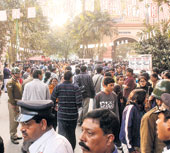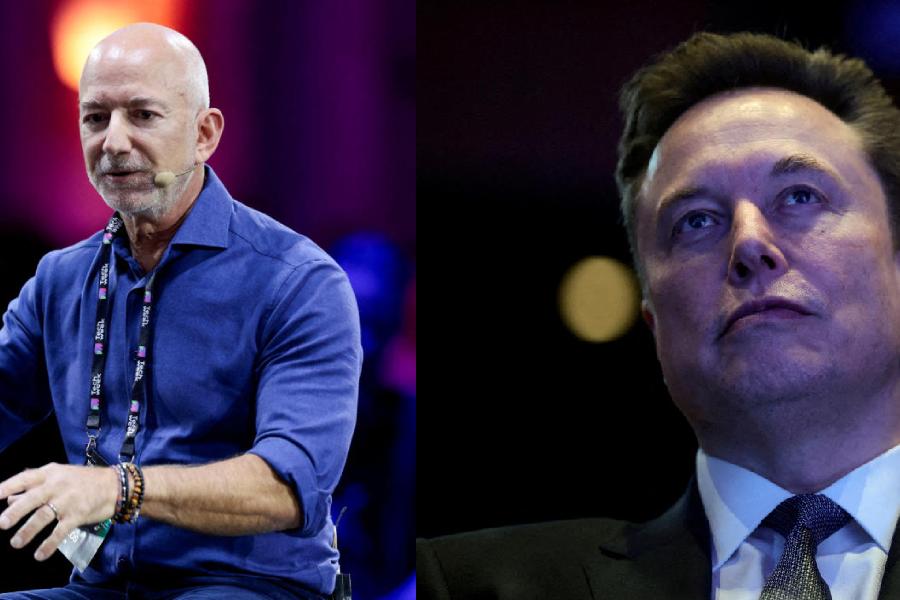 |
Violence on campuses is on the rise with students. And many feel that this violence today has less to do with politics and more with students’ attitude shaped by competition.
Take the case of Bengal Engineering and Science University (Besu), Shibpur. While this 150-year-old institute is at a crucial juncture on its way to being upgraded to an Institute of National Importance, its students continue to break rules, boycott exams and indulge in violence. Two other elite institutes in the state, Jadavpur University (JU) and Presidency College, have also of late faced violence in varying measures, particularly during students’ elections.
Things at Besu came to such a pass that Section 144 had to be imposed on the campus. The prohibitory order generally used to contain communal violence was imposed for the first time at the behest of the university authorities, if only for 24 hours, from December 14 evening to December 15 evening. Students were forced to vacate their hostels and semester exams were postponed indefinitely.
Besu has been on the boil since 2004, each year culminating in greater violence. Last year on August 12, it led to the death of Soumik Basu, a third-year engineering student. Soumik died as rival unions clashed on the campus.
While Besu has constantly been in the news, JU and Presidency, too, have had their share of violence during student elections. During elections there is invariably violence on campus, admit Surajit Bhakta, the vice-president of the Faculty of Engineering and Technology Students’ Union (Fetsu) at JU, and Agari Chakrabarti, an Independent Consolidation (IC) member at Presidency College. Recently a report of an inquiry commission probing the fortnight-long violence in JU after the students’ elections in April last year blamed the CPM-backed unions for the incident.
Both the JU and Presidency unions have the same horse to flog, the SFI. Says Bhakta: “The SFI deliberately taunts, rags students and passes obscene remarks, as if encouraging us to react. They forcibly occupy the union room, create a ruckus when our union members celebrate their victory and create an obstruction in maintaining a peaceful atmosphere.”
Students at Besu couldn’t agree more. “We have our own union in college, the Bengal Engineering College Students’ Union (Becsu), which is headed by the IC. And the SFI is trying very hard to make inroads,” says Mohor Sen, who passed out from Besu in 2007.
Soumik died when Mohor was an active member of the IC at Besu and “after this devastating incident both the IC and the SFI had resolved that our college union would be devoid of any affiliations. So for a year, no IC or SFI existed. It was just Becsu and there was no violence.” But both the IC and SFI are active again at Besu and “it might be pertinent to note that CPM MP Mohammad Salim’s son is a first-year student at the university”, says Sen.
Campus unrest is not new in West Bengal or India. It has spawned political movements like the Naxalbari unrest. But today violence among students takes a more sinister form. Most agree it is less to do with political ideology and more with turf war, a eagerness to grab control — and the GeNext agenda of securing the best job at any cost.
“Student unrest is a tradition of anti-establishment movement. Before Independence, it took the form of the anti-imperialist struggle. Today it is anti-Congress or anti-Left,” says sociologist and former Presidency College professor Prasanta Roy.
Amitabha Ghosh, the dean of IIT Kharagpur, an ex-student and a former faculty member of Besu, differs. “I have not seen such violence in my days at Besu from 1958 to 1970. And besides, at the IIT campuses in Kharagpur and Kanpur, where I have taught, students are much more intensely involved with governance. They are full-fledged senate members. But there is hardly any politics on the campus, either anti- or pro-establishment.”
The violence may also have to do with boys having a lot of spare time, particularly in residential colleges. “Academic pressure is low. After the rigour of the higher secondary exams, the undergraduate course is a cakewalk for us,” says Sen. Besu VC N.R. Banerjea has been alleging that teachers at Besu hardly spend time with students outside classes. He has urged the teachers to spend 40 hours a week with students. However, says Amitabh Ghosh: “Contact hours with students are quite high in Besu at 30-32 hours a week, while at IIT Kanpur, it is only 24 hours a week. But what keeps the IITians busy is a slew of term papers and undergraduate research projects.”
Besu and JU hardly engage undergraduate students in research projects. Says Partha Pratim Chattopadhyay, a mechanical engineering teacher and secretary of teachers’ union at Besu: “Corporates are willing to pour in millions in college fests and socials but are loathe to fund academic research projects.” He rues the absence of sponsored research and industrial counselling, a vital avenue of undergraduate research at IIT campuses.
Added to this is the phenomenon of campus recruitment that starts right from the third year (at JU) that assures students of jobs at the end of their courses. “Once a student secures a job, he hardly has any pressure to perform,” says Chattopadhyay.
While Roy is unwilling to blame early campus recruitment for the degeneration of the student community, Ghosh of IIT and Chattopadhyay of Besu feel that it is senseless to let companies recruit from the third year. “We at the IITs have taken a unanimous decision not to let placements happen before the second half of the eighth semester. On what basis are the companies recruiting if a student hasn’t completed the syllabus? That indicates that they are judging the candidates on non-engineering capabilities,” said Ghosh.
It is these skills that students seek to develop when they enter the portals of higher education. “A first-year student is driven by the one-point agenda of a six-figure salary. And for that they are willing to do anything. This inculcates an aggressive consumerist regimentation on campus, an attitude of dominance that manifests itself in violence. ‘I-have-to-have-the-best-job’ syndrome is not conducive to higher academics and research,” says Chattopadhyay, who rues the loss of brilliant mechanical engineering students to the IT industry in recent recruitments.
Ghosh, too, says 80 per cent of IIT engineers are with banks, insurance companies and venture capital firms because they offer the phenomenal salaries.










